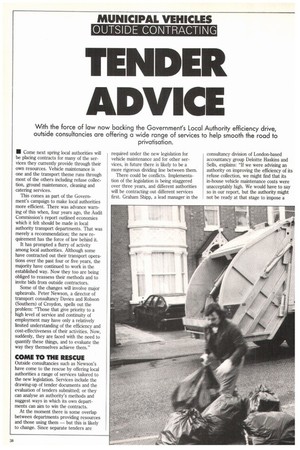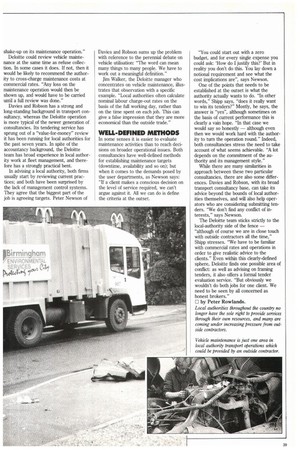TENDER ADVICE
Page 36

Page 37

If you've noticed an error in this article please click here to report it so we can fix it.
With the force of law now backing the Government's Local Authority efficiency drive, outside consultancies are offering a wide range of services to help smooth the road to privatisation.
• Come next spring local authorities will be placing contracts for many of the services they currently provide through their own resources. Vehicle maintenance is one and the transport theme runs through most of the others including refuse collection, ground maintenance, cleaning and catering services.
This comes as part of the Government's campaign to make local authorities more efficient. There was advance warning of this when, four years ago, the Audit Commission's report outlined economies which it felt should be made in local authority transport departments. That was merely a recommendation; the new requirement has the force of law behind it.
It has prompted a flurry of activity among local authorities. Although some have contracted out their transport operations over the past four or five years, the majority have continued to work in the established way. Now they too are being obliged to reassess their methods and to invite bids from outside contractors.
Some of the changes will involve major upheavals. Peter Newson, a director of transport consultancy Davies and Robson (Southern) of Croydon, spells out the problem: "Those that give priority to a high level of service and continuity of employment may have only a relatively limited understanding of the efficiency and cost-effectiveness of their activities. Now, suddenly, they are faced with the need to quantify these things, and to evaluate the way they themselves achieve them."
COME TO THE RESCUE
Outside consultancies such as Newson's have come to the rescue by offering local authorities a range of services tailored to the new legislation. Services include the drawing-up of tender documents and the evaluation of tenders submitted; or they can analyse an authority's methods and suggest ways in which its own departments can aim to win the contracts.
At the moment there is some overlap between departments providing resources and those using them — but this is likely to change. Since separate tenders are required under the new legislation for vehicle maintenance and for other services, in future there is likely to be a more rigorous dividing line between them.
There could be conflicts. Implementation of the legislation is being staggered over three years, and different authorities will be contracting out different services first. Graham Shipp, a lead manager in the consultancy division of London-based accountancy group Deloitte Haskins and Sells, explains: "If we were advising an authority on improving the efficiency of its refuse collection, we might find that its in-house vehicle maintenance costs were unacceptably high. We would have to say so in our report, but the authority might not be ready at that stage to impose a shake-up on its maintenance operation."
Deloitte could review vehicle maintenance at the same time as refuse collection. In some cases it does. If not, then it would be likely to recommend the authority to cross-charge maintenance costs at commercial rates. "Any loss on the maintenance operation would then be shown up, and would have to be carried until a full review was done."
Davies and Robson has a strong and long-standing background in transport consultancy, whereas the Deloitte operation is more typical of the newer generation of consultancies. Its tendering service has sprung out of a "value-for-money" review it has been running for local authorities for the past seven years. In spite of the accountancy background, the Deloitte team has broad experience in local authority work at fleet management, and therefore has a strongly practical bent_ In advising a local authority, both firms usually start by reviewing current practices; and both have been surprised by the lack of management control systems. They agree that the biggest part of the job is agreeing targets. Peter Newson of Davies and Robson sums up the problem with reference to the perennial debate on vehicle utilisation: 'The word can mean many things to many people. We have to work out a meaningful definition."
Jim Walker, the Deloitte manager who concentrates on vehicle maintenance, illustrates that observation with a specific example. "Local authorities often calculate nominal labour charge-out rates on the basis of the full working day, rather than on the time spent on each job. This can give a false impression that they are more economical than the outside trade."
WELL-DEFINED METHODS
In some senses it is easier to evaluate maintenance activities than to reach decisions on broader operational issues. Both consultancies have well-defined methods for establishing maintenance targets (downtime, availability and so on); but when it comes to the demands posed by the user departments, as Newson says: "If a client makes a conscious decision on the level of service required, we can't argue against it. All we can do is define the criteria at the outset. "You could start out with a zero budget, and for every single expense you could ask: 'How do I justify this?' But in reality you don't do this. You lay down a notional requirement and see what the cost implications are", says Newson.
One of the points that needs to be established at the outset is what the authority actually wants to do. "In other words," Shipp says, "does it really want to win its tenders?" Mostly, he says, the answer is "yes", although sometimes on the basis of current performance this is clearly a vain hope, "In that case we would say so honestly — although even then we would work hard with the authority to turn the operation round." Indeed, both consultancies stress the need to take account of what seems achievable. "A lot depends on the commitment of the authority and its management style."
While there are many similarities in approach between these two particular consultancies, there are also some differences. Davies and Robson, with its broad transport consultancy base, can take its advice beyond the bounds of local authorities themselves, and will also help operators who are considering submitting tenders. "We don't find any conflict of interests," says Newson.
The Deloitte team sticks strictly to the local-authority side of the fence — "although of course we are in close touch with outside contractors all the time," Shipp stresses. "We have to be familiar with commercial rates and operations in order to give realistic advice to the clients." Even within this clearly-defined sphere, Deloitte finds one possible area of conflict: as well as advising on framing tenders, it also offers a formal tender evaluation service. "But obviously we wouldn't do both jobs for one client. We need to be seen by all concerned as honest brokers."
0 by Peter Rowlands.
Local authorities throughout the country no longer have the sole right to provide services through their own resources, and many are coming under increasing pressure from outside contractors.
























































